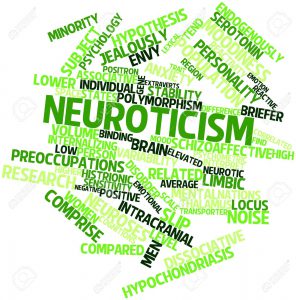Neuroticism is a personality trait characterised by easily experiencing negative emotions. This A-Z blog offers some highlights of what is currently known about the genetic and environmental influences on neuroticism, as well as its overlap with and relevance for psychiatric disorders.
Background
Personality is widely held to be comprised of five broad factors, defined as: openness to experience, conscientiousness, extraversion, agreeableness, and neuroticism. People who are more neurotic are more likely than average to experience regular feelings of low mood, anxiety, worry, fear, anger, frustration and envy. High neuroticism scores relate to increased sensitivity to stressful environments and a cautious vigilant outlook. The following questions are examples of items used to measure neuroticism in individuals (in the UK Biobank):
- Do you ever feel ‘just miserable’ for no reason?
- Do you worry too long after an embarrassing experience?
- Are you often troubled by feelings of guilt?
Like other personality traits, neuroticism is typically viewed as a continuous dimension rather than a discrete category. This means that everyone’s personality can be scored somewhere along the spectrum of neuroticism, rather than saying that some people are “either neurotic or not neurotic”. Neuroticism is strongly associated with common mental health disorders such as depression and anxiety – which are more likely to manifest in individuals who experience higher levels of neuroticism. (See this article to find out about the mechanisms connecting neuroticism and common mental disorders).
Neuroticism is the single strongest predictor of common mental disorders including depression, anxiety, schizophrenia and substance abuse, and is also associated with important life outcomes such as occupational attainment, divorce, and mortality (Ormel et al. 2013).
Woody Allen: notoriously neurotic
Genetics of Neuroticism
Twin studies suggest that 40-60% of the variation in neuroticism is influenced by genetic differences (Hettema et al. 2004). Longitudinal twin studies have also provided insights, for example that the increasing stability of personality as individuals get older is due to increasingly stable environmental influences (Briley & Tucker-Drob, 2014).
In recent years, ever-larger genome-wide association studies have been able to identify specific genetic variants that are associated with variation in neuroticism. The largest genome-wide association study of neuroticism to date (N=449,484), identified 136 independent genome-wide significant loci. Interestingly, gene-set analyses implicated pathways of neurogenesis (the production of neurons) and behavioural response to cocaine (Nagel et al. 2017).
In a recent UK Biobank study (N=375,913) (Nagel et al. 2018), researchers showed that individual questionnaire items reflecting different symptoms of neuroticism are influenced by different genes. Genetic influences on neuroticism seemed to operate in two key clusters influencing ‘depressed affect’ or ‘worry’. The two clusters showed different patterns of genetic correlations with other traits such as BMI, educational attainment, and ADHD. These patterns would go undetected when investigating a composite Neuroticism score.
Neuroticism and the environment
While neuroticism is conceptualised as a trait that is stable across a person’s lifetime, previous research efforts have shown that this trait can be influenced by environmental factors – which “affect central aspects of one’s identity and status” (Jeronimus et al., 2013). For example, greater prestige, work-satisfaction, financial security and relationship security have been associated with long-term decreases in neuroticism. Conversely, stressful experiences including unemployment, shift-work, relationship conflicts, illness and being a victim of crime have all been associated with increases in neuroticism. Understanding the types of environments that impact neuroticism could lead to the development of successful prevention strategies aimed at reducing vulnerability for mental health disorders, inherent among individuals who score high for neuroticism.
Intriguingly, neuroticism shows significant polygenic overlap with stressful life events (genetic correlation=0.15 (se=0.07)) (Clarke et al. 2017). This suggests that stressful life events are not just ‘external’ risk factors but that genes predisposing individuals to be neurotic also lead them to experience stressful life events. This could be because individuals select themselves into or evoke stressful experiences, and/or higher neuroticism primes them to respond worse to/report more life events. Further work is needed to better understand the directions of effects.
References
- Briley, D.A. and Tucker-Drob, E.M. 2014. Genetic and environmental continuity in personality development: a meta-analysis. Psychological Bulletin 140(5), pp. 1303–1331.
- Clarke, T.-K., Navrady, L., Zeng, Y., Xia, C., Haley, C., Campbell, A., Navarro, P., Amador, C., Adams, M., Howard, D.M., Arnau Soler, A., Hayward, C., Thomson, P., Smith, B., Padmanabhan, S., Hocking, L., Hall, L., Porteous, D., Deary, I. and McIntosh, A. 2017. Genetic and environmental determinants of stressful life events and their overlap with depression and neuroticism. BioRxiv.
- Hettema JM, Prescott CA, Kendler KS (2004) Genetic and environmental sources of covariation between generalized anxiety disorder and neuroticism. Am J Psychiatry 161: 1581-1587.
- Jeronimus, BF (2015) Environmental Influences on Neuroticism A story about emotional (in)stability. PhD Thesis, published online: <https://www.researchgate.net/profile/Bertus_Jeronimus/publication/273137459_Environmental_influences_on_neuroticism_A_story_about_emotional_instability/links/54f981430cf210398e98cbeb/Environmental-influences-on-neuroticism-A-story-about-emotional-instability.pdf>
- Nagel, M., Jansen, P.R., Stringer, S., Watanabe, K., de Leeuw, C.A., Bryois, J., Savage, J.E., Hammerschlag, A.R., Skene, N., Munoz-Manchado, A.B., 23andMe Research Team, Linnasrsson, S., Hjerling-Leffler, J., White, T., Tiemeier, H., Polderman, T.J., Sullivan, P.F., van der Sluis, S. and Posthuma, D. 2017. GWAS Meta-Analysis of Neuroticism (N=449,484) Identifies Novel Genetic Loci and Pathways. BioRxiv.
- Nagel, M., Watanabe, K., Stringer, S., Posthuma, D. and van der Sluis, S. 2018. Item-level analyses reveal genetic heterogeneity in neuroticism. Nature Communications 9(1), p. 905.
- Okbay, A., Baselmans, B.M.L., De Neve, J.-E., Turley, P., Cesarini, D., et al. 2016. Genetic variants associated with subjective well-being, depressive symptoms, and neuroticism identified through genome-wide analyses. Nature Genetics 48(6), pp. 624–633.
- Ormel, J., Jeronimus, B.F., Kotov, R., Riese, H., Bos, E.H., Hankin, B., Rosmalen, J.G.M. and Oldehinkel, A.J. 2013. Neuroticism and common mental disorders: meaning and utility of a complex relationship. Clinical Psychology Review 33(5), pp. 686–697.




